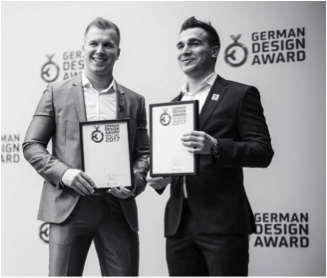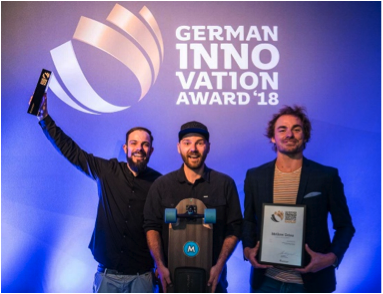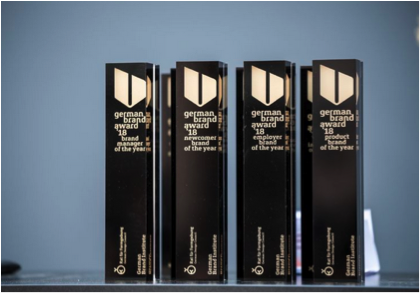Fellowship program for the protection of digital brand personalities with the German Design Council and Phoenix Design
Strong brands change our behavior and secure companies profitable positions in international competition. Companies invest in the communication of their brand in order to generate relevance and credibility with the target groups and to create differentiation from the competition. The understanding of brands is no longer a fixed brand image with rigid messages, but a flexible, essentially constant interaction pattern that interacts with customers primarily via digital channels. It is the multisensory experience that is permanently imprinted on the memory and thus manifests itself as a strong brand.
For companies it is important to generate these brand moments along the customer journey, to shape them and to exclude them from the competition in order to suppress imitation at this sensitive point. Brand added value is also created in digital worlds of experience through design and must be protected all the more assertively and sustainably in this particularly easy-to-copy form.
The aim of the fellowship program is to work on the topic: “Suppression of imitation through IP, for design-based added value in brand experiences for digital products and services”.
In his welcoming address to the Fellowship Program, Andreas Diefenbach, Member of the Board at the program partner Phoenix Design, emphasizes: “As an industrial location, Germany has invented and shaped many strong brands like no other. The essence of every brand implies “The warm glow of familiarity”. The power of this implicit memory is an essential driver and influencing factor for branding and branding. In the digital age, some supposedly manifest rules of brand management are broken or turned upside down. New factors such as participation or adaptability shape existing or create new brands. In this context, IP will play an enormous role in securing added value, because the meaningful moments with a brand are what will continue to create trust, orientation and differentiation in the networked society.”
Phoenix Design is one of the most renowned design houses in Europe. Since it was founded in 1987, well over 700 international design awards have been won. Phoenix creates design as an interaction: between product and user, between brand and consumer, between designers and clients. Customers include typical design brands such as Axor, Audi, BenQ, Berendsohn, Bionic Motion, Duravit, Fraunhofer Institute, Gira, Gigaset, Falk-United Navigation, Hansgrohe, Hewi, Hirschmann, Huawei, Hüppe, Internorm, Interstuhl, Kaldewei, KaVo, Lamy, Laufen, LG, Loewe, Mercedes Benz, Metrax, Puma, Reiner SCT, Selux, Siteco, Trumpf, Tvilum, Viessmann, Vorwerk, Zeiss.
 Andrej Kupetz, General Manager of the German Design Council, represents the second program partner in this fellowship initiative: “For some time now, design thinking as a strategy to successfully establish innovations in the market has been the ideal solution. Design thinking means addressing customer needs in the best possible way with radical customer orientation. But the approach falls short if the sender of the offer – regardless of whether it is a product or a service – does not come up with a clearly identifiable brand design that differentiates itself in the market. This is all the more true in digital worlds of experience. A digital service may have perfect user guidance and quickly reveal its offer to the user. However, if the sender behaves almost neutrally or interchangeably, the potential to inspire customers emotionally is simply wasted. At the same time, there is no requirement to obtain and defend IP rights. So it is high time to convey and establish brand design thinking as a value-adding strategy in digital worlds of experience.”
Andrej Kupetz, General Manager of the German Design Council, represents the second program partner in this fellowship initiative: “For some time now, design thinking as a strategy to successfully establish innovations in the market has been the ideal solution. Design thinking means addressing customer needs in the best possible way with radical customer orientation. But the approach falls short if the sender of the offer – regardless of whether it is a product or a service – does not come up with a clearly identifiable brand design that differentiates itself in the market. This is all the more true in digital worlds of experience. A digital service may have perfect user guidance and quickly reveal its offer to the user. However, if the sender behaves almost neutrally or interchangeably, the potential to inspire customers emotionally is simply wasted. At the same time, there is no requirement to obtain and defend IP rights. So it is high time to convey and establish brand design thinking as a value-adding strategy in digital worlds of experience.”
 The German Design Council was founded in 1953 as a foundation based on a resolution of the German Bundestag with the express mandate to support the German economy in design as an economic and cultural factor. The German Design Council forms a platform for communication between all those involved in the design process. The German Design Council has over 300 foundation members such as ABUS, B. Braun, Blanc & Fischer, Bosch, Viessmann, Caparol, Festo, Hansgrohe, Miele, Recaro, Wilo and Vorwerk. The German Design Council awards various prizes, such as the German Innovation Award, German Design Award and the German Brand Award.
The German Design Council was founded in 1953 as a foundation based on a resolution of the German Bundestag with the express mandate to support the German economy in design as an economic and cultural factor. The German Design Council forms a platform for communication between all those involved in the design process. The German Design Council has over 300 foundation members such as ABUS, B. Braun, Blanc & Fischer, Bosch, Viessmann, Caparol, Festo, Hansgrohe, Miele, Recaro, Wilo and Vorwerk. The German Design Council awards various prizes, such as the German Innovation Award, German Design Award and the German Brand Award.

Fellows have the opportunity to join the Research Training Group ‘s excellence groups within the Diesel Board of Trustees in Germany and are supported by the German Design Council and Phoenix Design during their doctorate through the network and professional support. The cooperation and interaction with various industrial partners and doctoral students within the framework of the program gives them the opportunity to work on more complex topics and gain deeper insights into the target areas.
Applicants can find more information about the program and how to apply here.



